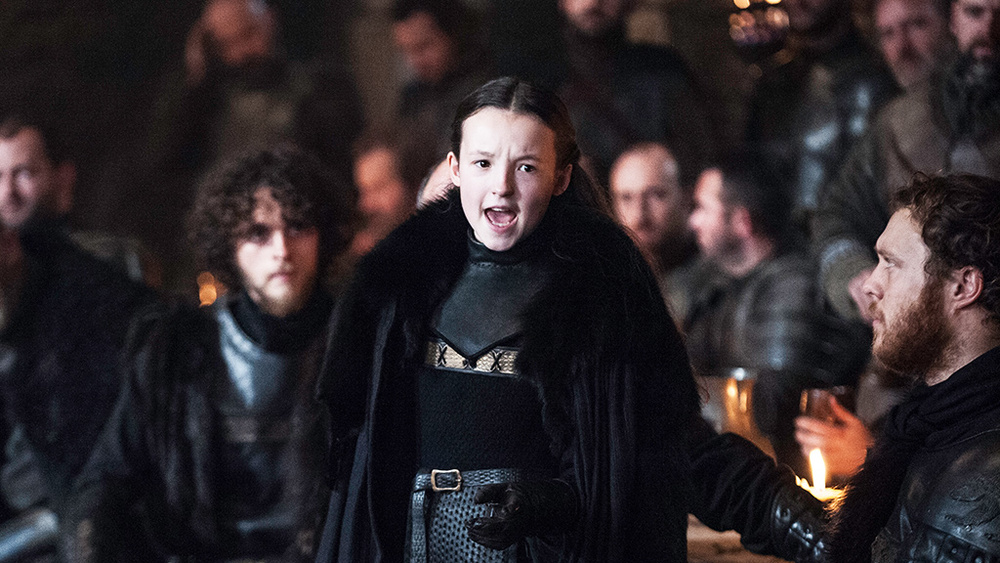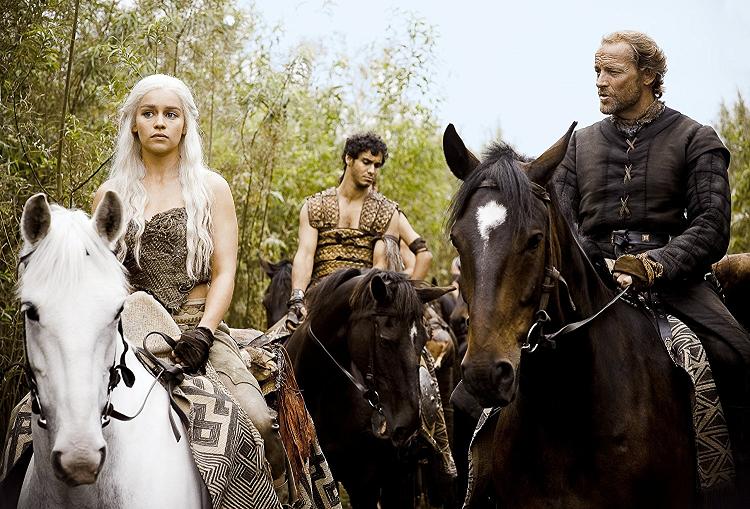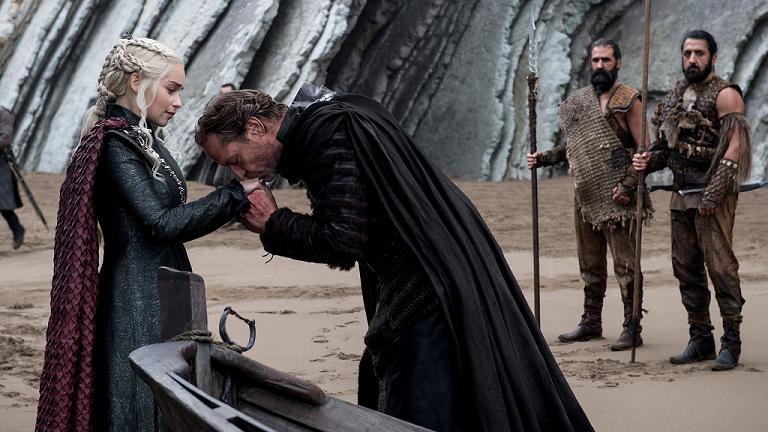In the Game of Thrones Season Seven finale, the Stark and Targaryen coalition leaders made their plans for transplanting the Targaryen troops from the middle of Westeros to where they’re most needed: the North. What followed was some very specific logistical dialogue:
Jon: If we have the Dothraki ride hard on the Kingsroad, they’ll arrive at Winterfell within the fortnight.
Daenerys: And the Unsullied?
Jon: We can sail with them to White Harbor, meet the Dothraki here on the Kingsroad, and ride together to Winterfell.
Ser Jorah Mormont suggested that the queen fly to Winterfell on her dragon, to avoid any shenanigans along the way. (I’m willing to assume that Jorah was being straightforward and worried more about vengeful northerners with crossbows than one particular King in the North on a boat with his Khaleesi.)
I found this a refreshing conversation, largely because the show had been rather light in logistics discussion, with troops and fleets inexplicably appearing where they needed to be to advance the required plot situation without necessarily laying the groundwork.
The point of the scene was probably just to establish Dany and Jon having berths on the same dragon-prowed galleon, for reasons, but I was more interested in hearing the details on troop movements. And all the implications that entailed.
Daenerys was sending her mounted warriors, the fearsome Dothraki, up the road through the North to Winterfell. Presumably Jon would be sending ravens to important locations, such as Moat Cailin and Winterfell, letting them know that the horselords were allies. Presumably the Dothraki could be trusted to follow a road despite not being familiar with Westeros; but I’m fairly certain that Daenerys would be sending along a trusted emissary who could not only communicate with the Dothraki in their language, but was also familiar with the lay of the land and the customs of the North.
That emissary would likely be Ser Jorah Mormont.
Ser Jorah is from the North, from Bear Island in particular, and he’s fluent in Dothraki. When traveling with Khal Drogo’s khalasar, Jorah the Andal was respected among that host. He certainly has the skills and background to function as Dany’s emissary, ushering the Dothraki into the North and respecting/enforcing any safe-conducts.
Unfortunately, Jorah is probably far more respected among the Dothraki than he is among his own people. To the average northerner, Ser Jorah is a law-breaking exile. The fact that he’s come back to Westeros serving the daughter of the Mad King and leading an army of essentially wildlings on horses will probably not sit well with the people of the North.
Jorah has a lot of factors that already can set him apart from his fellow countrymen. Bear Island is unconnected from the main North (because… island) and if Lady Lyanna Mormont’s attitude that one Bear Islander is worth ten mainlanders, if that’s a known bias among the folk of Bear Island, then it’s probably true that the rest of the North probably consider Bear Islanders a bit … smug?
Ser Jorah is a war hero in his way. King Robert Baratheon knighted him for his conspicuous bravery and martial prowess during the siege of Pyke.
Thoros of Myr: Allegedly, I was awesome in that fight as well. Or so I’ve been told. Blackout drunk, you know.
But, knights are rather uncommon in the North, since it’s an Andal thing more than a First Man thing. Ser Jorah probably was respected for his distinction, but I assume there was a certain feeling that perhaps Jeor Mormont’s son was putting on southern airs.
Jorah even married a southern woman, a Hightower lady from the Reach. Now, there’s nothing wrong with marriages going outside the geographic region. After all, Rickard Stark had planned on marrying a son to a Riverlands girl and a daughter to a southerner from the Stormlands. But I assume some northern folk were wondering if the lord of Bear Island thought he was too good for their daughters.
Shortly after his marriage, Jorah fell on tough financial times while trying to satisfy his lady wife with expensive southern entertainments, and he sold some poachers into slavery in an attempt to pay the bills. The word got out, as it does, and Ser Jorah had to flee into exile or risk losing his head to Ned Stark’s judgment (and sword.) Once you’re on Ned Stark’s naughty list, it’s hard to get your name off.
So Jorah’s return to the North should elicit some well-deserved harsh words from his countrymen.

Lady Lyanna Mormont: Trust me when I say that I’ve got some things planned to say to my kinsman.
Although Jorah might not be able to avoid caustic comments from Lady Mormont, at least he doesn’t have any secrets for Three Eyed Raven Bran Stark to reveal. Littlefinger discovered how dangerous Bran’s supernatural abilities can be.
Ser Jorah: I can honestly say that I’ve never pushed that boy out of a window.
Ser Jaime: Well, now you’re bragging.
In fact, since Bran and Sam Tarly have been companionably comparing notes, it’s possible that Jorah might get a warmer than expected reception from Bran, by his association with Sam the Slayer.
Sam saved Jorah from the dreaded disease greyscale, largely to honor Sam’s service with Jorah’s father. A bond was formed between Sam and Jorah through the arduous ordeal of the greyscale procedure, and the two men left on good terms of mutual respect. But we shouldn’t consider this a sure thing. Jorah’s beloved queen roasted Sam’s father and younger brother on the Rose Road. Randyll Tarly was an awful father, but it’s unclear how Sam might feel about this.
It’s not a given if Jorah is even interested in trying to make amends or redeem himself in the eyes of the North, even if he could. It’s not like Jorah can unenslave the men he sold.
In truth, Jorah appears to have made peace with himself in regards to a clean break from the land of his birth. He turned down his original pardon from Robert Baratheon, and opted not to pursue the re-issue of the same pardon from Tywin Lannister. When far adventuring north beyond-the-Wall, Jon Snow offered to Jorah the ancestral blade of the Mormonts, Longclaw.
Jorah refused, essentially severing ties to his northern lineage. As far as Jorah is concerned, the North is entirely in his past and his future is inextricably bound to Daenerys Targaryen. (Which tracks with his refusal to respect her royal restraining orders for several seasons.)
But there still is an option for Ser Jorah to wash himself clean of any harbored resentment among his countrymen.
We can debate if there will be a Night’s Watch, or even a need for a Night’s Watch when the series concludes, but it seems entirely appropriate that Jorah evetually take the black. By selling men into slavery he deserved to be executed, so the Wall would be a lenient sentence. His father served with distinction, and Jorah spoke highly of his father’s service and respect for the institution.
Jeor Mormont wanted Jorah to take the black.
By abandoning the North, refusing Longclaw, and giving up his lordship of Bear Island, Jorah is already well suited for the “hold no lands” part of the Night’s Watch oath. He can’t harbor any illusions of a life with Daenerys Targaryen (especially with Jon Snow in the picture) and what woman could compare to the Mother of Dragons? It seems that the oath’s “take no wives, father no sons” clause is also covered.
By taking the black, Jorah’s crimes in the North would be forgiven (whether he cared about that or not) and he could settle down and live out a purpose-filled life, after years of wandering in exile over the mistakes of his youth.
And we already know, thanks to the Season Seven costume designer, that Jorah looks good in black.
After helping to end the Long Night, serving alongside Jon Snow, and taking the black, maybe even the ghost of Lord Eddard Stark could forgive Ser Jorah Mormont. Not that it matters to Jorah. There’s only one person whose opinion matters to him.
Anything else would be gravy.
Hot Pie: YOU CANNOT GIVE UP ON THE GRAVY!
The post Ser Jorah Mormont: the Exile’s Return appeared first on Watchers on the Wall.
Via http://watchersonthewall.com




No comments:
Post a Comment